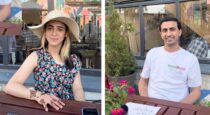The community festival dedicated to International Refugee Day, which took place on June 20th, can be summed up in one word: sunny. The evening featured Georgian silver jewelry, culinary delights from Togo, Ukrainian electronic music, and much more. Those interested had the opportunity to meet and chat with refugees who had arrived in Estonia, asking them about reasons for leaving their homeland or their adaptation experiences here. Some of them were willing to share their stories with us. Tahsin, Hanna, Senami, and Gulistan’s stories were written down by volunteer Karolin Martinson from the center.
The goal of the community festival on Refugee Day was to show solidarity towards those who have arrived here in Estonia. To dispel fears and uncertainties related to refugees, we invited everyone to the festival to get to know each other – to talk face to face, listen to music, taste dishes, and explore the craft market. Together, we enjoyed a diverse evening that offered glimpses of Kenya, Georgia, Togo, Turkey, Afghanistan, Ukraine, and Tajikistan!
The movement called “The Human Library” originated in Denmark in 2000. By bringing together people who wouldn’t normally meet and giving them the opportunity to share their stories, it aims to break down prejudices and uphold human dignity. The Human Library is similar to a regular library, but instead of books, the “books” are people who have been discriminated against or stigmatized.
Tahsin, originally from Turkey, was forced to leave his home country due to political persecution. After the attempted coup in 2016, opposition supporters, including Tahsin, were sought after and arrested. He could no longer find work or enroll in university. Tahsin arrived in Estonia a year and a half ago and immediately started learning the language. As an active person, he has found various ways to practice, whether through conversations with his Estonian language buddy or by engaging in volunteer work. He has now reached a B2 level in the Estonian language. While Tahsin’s opportunities were limited in Turkey, he feels free in Estonia and considers it his second homeland or, as they say in Turkey, his motherland. He plans to apply for a master’s degree at Tallinn University to become a mathematics teacher.

Gulistan arrived in Estonia from Syria when she was just a young child. Her family was greeted by a cold winter upon their arrival. Her first memory of Estonia is seeing snow. While the cold weather was initially a shock, she has now become accustomed to it and actually prefers the cold winter climate. She also loves fresh salads, which were not common in Syria. It’s difficult for her to pick a favorite Estonian dish, but one thing she definitely doesn’t like is the fish soup served at school. Vao village holds a significant place for Gulistan in Estonia, as it was the first place her family settled when they arrived. It was in Vao that she started her schooling, began learning the Estonian language, and made her first local friends. She still visits her friends there, but Tallinn has now become her favorite with its various activities and diverse people.
Senam, an entrepreneur from Togo, has been living in Estonia for five years. He enjoys the climate here, finding it interesting and different compared to the heat in Togo! His favorite place in Estonia is Pärnu, thanks to its small size and tranquility. As for Estonian food, he likes potato salad, different fresh salads, and meat patties. He engages in selling Togolese crafts, supporting and developing sustainability within the local community. According to Senam, one of his best-selling products in Estonia is mosquito repellent balm made from various oils.

Hanna arrived in Estonia from Ukraine a year and three months ago. Her first memory of Estonia is the moment of crossing the border when an Estonian border guard gave her child a stuffed teddy bear as a gift. It is important for Hanna to respect and get to know local traditions while also not forgetting her own. She has quickly adapted to Estonian life and customs. Although the climate is a significant difference between Ukraine and Estonia, according to Hanna, people can get used to anything, and she has already adjusted to the cold weather. She enjoys the Old Town, Stroomi Beach, and the delicious and clean Estonian food products.

See you next year! Or – as they say in Turkey – Teşekkürler!
Refugee Day began to be celebrated half a century after the adoption of the 1951 UN Refugee Convention. It is also a day that gives us the opportunity to participate in the cultures brought by refugees living here, to learn from them, and to strengthen community ties. And above all, it is a day to celebrate the courage of those who have embarked on a journey from harsh realities into the unknown.
The Human Rights Center organizeed the community festival on Refugee Day in collaboration with the Estonian Refugee Council, a humanitarian aid organization that has been operating for 22 years, Sveta Bar, known for its diverse music program and open-mindedness, and IWNE (International Women’s Network In Estonia), which supports and empowers vulnerable women who have arrived in Estonia.
The activities of the Human Rights Ambassadors Network are funded by the Active Citizens Fund of the European Economic Area Grants, operated in Estonia by the Open Estonia Foundation in cooperation with the Estonian NGO Network.
Since you are here...
It is important to protect everyone’s human rights, because it helps to keep stability and peace in the society. There are many challenges for protection of human rights in Estonia: intolerance has really come out of the closet. Bad things happen when good people are too passive, but together we can make a change.
Estonian Human Rights Centre is the competent, accountable and impactful independent human rights organisation in Estonia. Your recurring or one-time donation helps to stand up for human rights everywhere: in courts, in the media, in schools, in the workplace, on the streets and in governmental venues.
Donating is easy, and you can use your credit card if donating from abroad.
Donate now